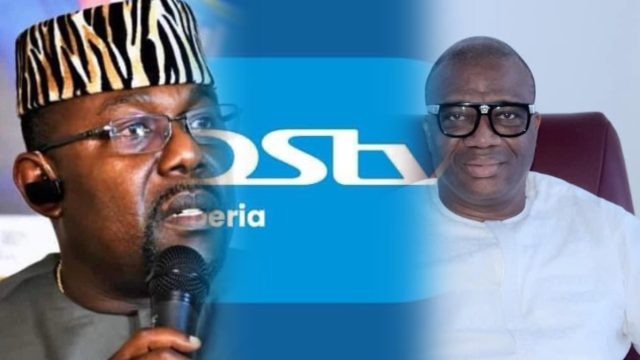Eugene Fahngon, Director General of the Liberia Broadcasting System (LBS), has publicly called for the shutdown of DSTV Liberia, citing the company’s alleged refusal to incorporate local content, specifically the Liberia National Television (LNTV), into its programming and its inability to operate locally.
LNTV serves as the television arm of LBS, and according to Fahngon, its inclusion on the DSTV network is critical for ensuring that Liberians have access to local programming on a major international platform. Fahngon’s demands come in the wake of allegations from the Consolidated Group Liberia, the official distributor of DSTV in Liberia, that the LBS head had reported them to the Liberian Legislature for their refusal to broadcast LNTV.
Addressing journalists on Monday, Fahngon clarified that he had never reported DSTV Liberia to the Legislature. Instead, he explained that both DSTV Liberia and other service providers were invited to a hearing by the House’s Committee on Post and Telecommunications to discuss broader issues within the broadcasting and telecommunications sector.
The main point of contention between LBS and DSTV appears to be financial. Fahngon claimed that DSTV Liberia is demanding a monthly payment of $38,000 USD from LBS for the inclusion of LNTV on its cable service, a cost the LBS DG says is unreasonable.
“The Liberia Broadcasting System will not pay a dime to DSTV for the inclusion of our national broadcaster,” Fahngon emphasized. He also referenced the PRC Decree, which established the LBS, granting the entity authority to oversee cable services in Liberia and ensure local content is provided to the public.
In his address, Fahngon further accused DSTV Liberia of operating without a proper local control system. He argued that the lack of a single control mechanism in the country renders DSTV unable to effectively function from within Liberia and that this failure is grounds for the company to be shut down.
The battle between LBS and DSTV Liberia highlights broader issues within Liberia’s broadcasting sector, especially concerning access to local content. Local television networks and content creators have long complained about being marginalized by larger international cable service providers who often fail to prioritize local programming.
This issue also has significant implications for Liberia’s media and entertainment industry. The integration of LNTV into DSTV’s programming would provide broader access to local news, entertainment, and educational content, as well as contribute to the growth of Liberia’s local content creators.
Fahngon’s push for local content comes at a time when many African nations are encouraging their media industries to increase the visibility of homegrown content on international platforms. DSTV, as one of the leading satellite television providers on the continent, faces similar demands from other African countries seeking greater representation for their national broadcasters.
As of now, DSTV Liberia has yet to publicly respond to Fahngon’s comments. The ongoing dispute will likely draw continued attention from the public, as well as from lawmakers who are keen on promoting local content and ensuring fair competition in the sector.
This development presents a challenge for both the Liberian government and DSTV Liberia as they navigate the complex dynamics of local broadcasting regulations and international business interests. How the dispute will be resolved remains uncertain, but it is clear that the future of broadcasting in Liberia, and the role of international providers like DSTV, hangs in the balance.
Business Implications
The call for DSTV Liberia’s shutdown, if executed, could significantly impact the Liberian television market. DSTV is one of the primary cable TV providers in Liberia, and its removal would create a vacuum that could either benefit local operators or further restrict access to diverse television programming for Liberian consumers. Additionally, the financial aspect of this dispute signals the broader challenges faced by state-run broadcasters like LBS in negotiating terms with international platforms, particularly when it comes to monetizing local content.For businesses reliant on DSTV advertising or those whose products are targeted to DSTV’s audience, a shutdown could also mean a need to reassess their media strategies. This situation warrants close monitoring by the private sector, as the outcome may influence future partnerships between local content providers and international broadcasters.












